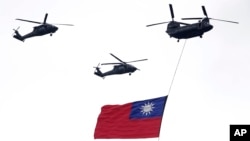The United States said on Tuesday that United Nations Resolution 2758, adopted in 1971, does not endorse the People's Republic of China's sovereignty claim over Taiwan, following Taiwan's exclusion from this week's World Health Assembly sessions.
World Health Assembly
The WHA, the decision-making body of the World Health Organization, began its annual meetings on Monday in Geneva, where member states, delegates and health experts gather to discuss global health priorities and security.
"We have repeatedly made clear that we think Taiwan should be able to participate in WHO sessions. When they were participants, they brought meaningful expertise that enriched the discussions and debates, and we want them to be allowed to participate in future sessions," said State Department spokesperson Matthew Miller during a Tuesday briefing.
Taiwan is excluded from most international organizations because of the objections by the People's Republic of China, which considers the self-governed democracy its territory. Chinese officials often cite U.N. Resolution 2758 to assert Beijing's "one China principle."
"No, it does not," Miller told VOA when asked if the resolution endorsed China's sovereignty claim over Taiwan.
On October 25, 1971, the U.N. General Assembly passed Resolution 2758, replacing the Republic of China (ROC, Taiwan's formal name) with the People's Republic of China as a permanent member of the Security Council. But it did not mention Taiwan's sovereignty status.
U.S. officials have said the resolution does not preclude Taiwan's meaningful participation in the U.N. system and other multilateral forums.
"Beijing mischaracterizes the resolution by falsely conflating it with China's one-China principle and wrongly asserts that it reflects an international consensus for its one-China principle," said Deputy Assistant Secretary of State Mark Lambert, who also heads the State Department's China House, at a recent event.
U.S. Secretary of State Antony Blinken has said U.S. support for Taiwan's meaningful participation in international forums aligns with Washington's one China policy, guided by the Taiwan Relations Act, the three Joint Communiques and the Six Assurances.
US policy, China's principle
The U.S.' one China policy differs from the PRC's one China principle, which Washington said it does not subscribe to.
Delegates from Taiwan attended the WHA as nonvoting observers from 2009 to 2016, during a period of relatively warm ties between Beijing and Taipei.
However, Beijing has blocked Taiwan's representation at WHO meetings since the self-ruled democracy elected Tsai Ing-wen, a China skeptic, as Taiwan's president in 2016 and again in 2020.
Tsai and her ruling Democratic Progressive Party (DPP) reject Beijing's condition that both sides of the Taiwan Strait belong under one flag. The two sides have been separately ruled since the 1940s.
"We would like to make it clear to the DPP authorities: the abiding commitment of the international community to the one-China principle is unshakable," a spokesperson from China's Ministry of Foreign Affairs said on Monday.
Without naming names, the spokesperson urged "certain countries" to stop "politicizing health issues" and "interfering in China's internal affairs."
"Using Taiwan to contain China will only end in failure," the spokesperson added.
Several countries, including the U.S., Britain, Canada, Australia, Germany and Japan, issued a joint statement on Friday supporting Taiwan's participation in the WHA annual meetings.
Chinese military drills
Meanwhile, following the inauguration of Taiwanese President Lai Ching-te, China conducted a two-day, large-scale military exercise last week, deploying 111 aircraft and 46 naval vessels around Taiwan.
Over the weekend, the U.S. expressed deep concern over the Chinese People's Liberation Army's joint military drills in the Taiwan Strait and around Taiwan. The U.S. State Department strongly urged Beijing to act with restraint.
"Using a normal, routine, and democratic transition as an excuse for military provocations risks escalation and erodes longstanding norms that have maintained peace and stability across the Taiwan Strait for decades," said the State Department in a statement.
Last week, U.N. spokesperson Stephane Dujarric told reporters that the United Nations has been following developments in the Taiwan Strait closely and urged restraint.
"On the issue of China, we are guided by the General Assembly resolution of 1971," said Dujarric. He was referring to U.N. Resolution 2758.
